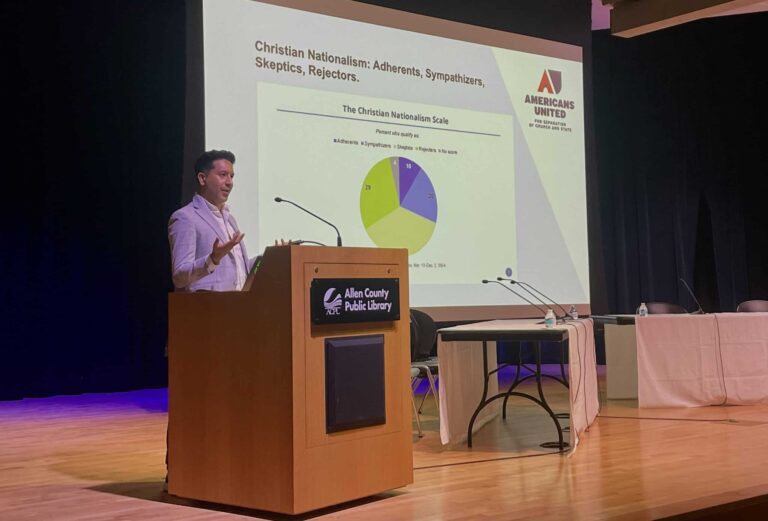
By Greta Lapp Klassen
The Indiana Citizen
September 15, 2025
FORT WAYNE – Although it has gained traction in recent years, Christian nationalism is not a new ideology, Moises Serrano of Americans United for Separation of Church and State told a crowd of concerned Indiana citizens on Saturday.
Serrano, media relations manager for Americans United for Separation of Church and State, a nonpartisan, nonprofit educational and advocacy organization dedicated to defending the separation of church and state, said the growth of Christian nationalism is a fear-based reaction to the changing demographics of our country.
The percentage of Americans who identify as Christians has been consistently shrinking since the 1990s, and it is projected that white Americans will make up less than half of the population by 2045. This means that soon, white Christians will no longer be the largest demographic group in America. Serrano said that this loss in majority status has resulted in a moral panic among Christian nationalists, who fear losing political and cultural power.
“When you are accustomed to holding privilege,” Serrano said, “progress towards equality can feel like oppression.”
Serrano was among the speakers at the Larry Hayes First Amendment Forum hosted by Hoosiers for Separation of Church and State on September 13. Around 130 Hoosiers crowded into the auditorium of the Allen County Public Library in Fort Wayne for the four-hour event which featured three keynote speakers, a panel discussion, homemade cookies and a musical performance.
At the beginning of the event, Evan Davis, founding member of Hoosiers for Separation of Church and State, acknowledged the recent assassination of Charlie Kirk, conservative activist and founder of Turning Point USA. Kirk was killed Sept. 10 while speaking to students at an event on the campus of Utah Valley University.
“We are here today to exercise the rights he was denied,” Davis told the crowd. “We hope that talking, listening and respecting each other can bring light to these dark times.”
In light of the assassination, the event organizers decided to hire armed officers for the event.
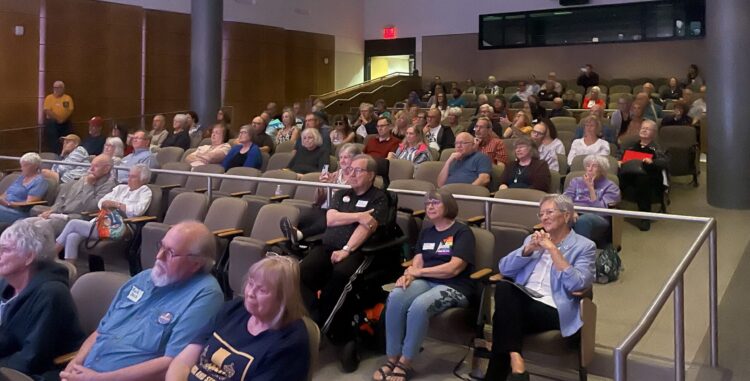
Based in Fort Wayne, Hoosiers for Separation of Church and State is the newly-formed Indiana chapter of Americans United for Separation of Church and State. Americans United was founded in 1947 in response to a Supreme Court case which ruled that taxpayer money may be used to provide transportation for students attending private Catholic schools.
According to their website, the national organization works in the courts, public square and legislatures to bring “together people of all religions and none to protect the right of everyone to believe as they want — and stop anyone from using their beliefs to harm others.”
Americans United considers Christian nationalism, the belief that the United States was founded to be a Christian nation and that Christian belief systems should be enforced by the law, to be an “existential threat” to American democracy and the separation of church and state.
Serrano spoke to the crowd on Saturday about the impact of Christian nationalism and what Americans United is doing to combat it. He cited a study by the Public Religion Research Institute (PRRI) which found that one third of Americans either adhere to or sympathize with the beliefs of Christian nationalism, including statements like “God has called Christians to exercise dominion over all areas of American society” and “being Christian is an important part of being truly American.”
This same study found that 33% of Hoosiers either adhere to or sympathize with Christian nationalist beliefs. Of its neighbors, only Kentucky had a higher percentage, 45% .
Serrano shared the story of Elizabeth and Gabriel Rutan-Ramy, a Jewish couple in Tennessee who were unable to adopt from state-funded Holston United Methodist Home for Children because they were not Christian. Americans United represented the couple in court and won a reversal at the Court of Appeals of Tennessee in August 2023 that allowed the couple to sue the state.
“Liz and Gabe’s own tax dollars were used to fund discrimination against them,” Serrano said, eliciting murmurs of outrage from the crowd.
Serrano offered attendees a few ways that they can help uphold the separation of church and state, including learning about Christian nationalism and forming local groups like Hoosiers for Separation of Church and State.
After Serrano finished his remarks, the attendees had a few minutes to mingle in the lobby outside the auditorium and peruse the booths of eight different organizations, which were offering informational materials about the work they do. The groups included the ACLU of Indiana, Secular Education Association, Indivisible Northeast Indiana, Vote 411, Northeast Indiana National Organization for Women, the Unitarian Universalist Congregation of Fort Wayne and Beacon Heights Church of the Brethren.
Fort Wayne resident Brian Hartz told The Indiana Citizen that he attended the forum on Saturday because he sees the rise in Christian nationalism and has concerns about the ways the Trump administration is “trampling on our rights.” He wanted to “hear from leaders in this field and get inspiration.”
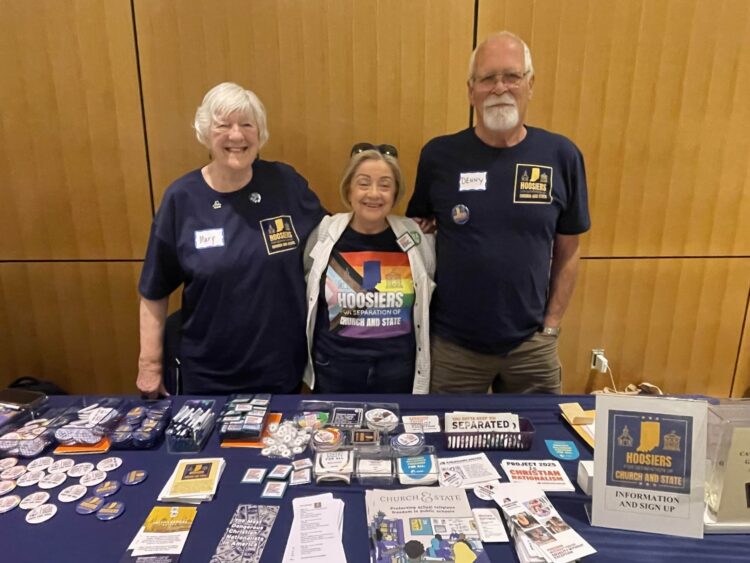
When the forum resumed, Sheila Suess Kennedy, professor emerita professor of law and public policy at the O’Neill School of Public and Environmental Affairs at IU Indianapolis, provided her analysis that Christian nationalism conflicts with the U.S. Constitution and Bill of Rights.
When Christian nationalist claim that the United States was “founded as a Christian nation,” Kennedy said, they are glossing over the fundamental ideological differences between the authors of our constitution, the Founding Fathers, and the Pilgrims and Puritans, known as the planting fathers, who first arrived in present-day Massachusetts in 1620.
“The Puritans and Pilgrims who first came to America,” Kennedy said, “defined liberty as freedom to do the ‘right’ thing, including freedom to worship and obey the ‘right’ God in the ‘true’ church — and to use the power of government to make sure your neighbors did too.”
In contrast, the Founding Fathers were heavily influenced by the ideas of the Enlightenment and had a more liberal definition of liberty. The philosophers of the Enlightenment defined liberty as personal autonomy, Kennedy said, explaining individuals were seen as having the right to make their own moral and political decisions, free from government coercion.
Consequently, the authors of the U.S. Constitution defined liberty as “freedom to do your own thing so long as you did not harm the person or property of somebody else, and so long as you recognize the equal right of other people to do their own thing.”
Kennedy noted that the phrase, “separation of church and state,” does not appear anywhere in the Constitution. She explained the Establishment and Free Exercise clauses of the first amendment work together to create what we now call the separation of church and state.
“The Establishment Clause prohibits the government from making any law respecting an establishment of religion,” Kennedy said. “The courts have uniformly held that this language not only forbids a government from establishing an official religion or state church, but it also prohibits government actions that endorse or sponsor religion, favor one religion over another, or that prefer religion to non-religion, or for that matter, non-religion to religion.”
Kennedy explained the Free Exercise Clause as prohibiting “government from interfering with the free exercise of religion,” which “protects the right of Americans to choose our own beliefs, and to express those beliefs without fear of state disapproval.”
“Read together, the Free Exercise Clause and the Establishment Clause require government neutrality in matters of religion,” Kennedy said. “The Establishment Clause forbids the public sector — that is government — from either favoring or disfavoring religion, and the free exercise clauses forbids government from interfering with expression of religious beliefs in the public square.”
Pointing to Indiana, Kennedy denounced politicians like Indiana Attorney General Todd Rokita and Lt. Gov. Micah Beckwith, a self-described Christian nationalist. “These men are so busy pursuing a Christian nationalist culture war they don’t have a whole lot of time to attend to the duties of their office,” she said.
Kennedy also echoed Serrano, saying throughout the country’s history, individuals and groups have always attempted to stop change.
“American liberty has always been a work in progress, frantically resisted by those who felt threatened and disoriented by social change,” she said. “There have always been Puritans, who like the planting fathers, believed that they should be able to use government to control the lives and behaviors of everyone else.”
Concluding her speech with a call for resilience, Kennedy received a standing ovation from the crowd.
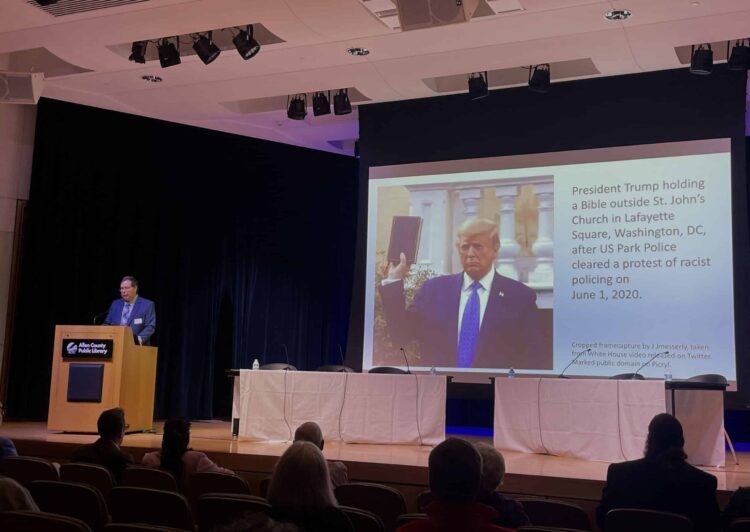
Following a longer break where members of Hoosiers for Separation of Church and State served homemade cookies, Daniel W. Ulrich, professor of New Testament studies at Bethany Theological Seminary in Richmond, Indiana, took the stage.
“I brought a Bible,” he began, “but not as a weapon — I promise!”
Ulrich said that the Bible is a complicated, contradictory text, and as a New Testament scholar and Christian, he chooses to focus on the teachings of Jesus. He believes that “Christian nationalism dangerously distorts or ignores” these teachings.
“The crucial question for American Christians is who or what are we worshipping?,” Ulrich said. “If we find ourselves worshiping a flag, or a nation, or a God who only blesses America, our love of country has become idolatrous.”
Ulrich also said that what many Christian nationalists claim as religious persecution — Christian holidays becoming less dominant in an increasingly secular society, for example — is really just the loss of privilege.
“Fears of losing privilege,” Ulrich said, “are common enough that politicians can use them and stoke them to gain power”
The final part of the forum was a panel featuring Steve Carr, director of Holocaust and genocide studies at Purdue University Fort Wayne; Laurie Gray, legislative coordinator for Indiana National Organization for Women: Jaqueline King, founder and CEO, Black Women Empowered; and Zach Parrish, co-founder of Secular Education Association.
The panelists were each asked how they see Christian nationalism impacting their work. Carr spoke about how Christian nationalism has long drawn on antisemetic tropes, and that these tropes, when combined with eugenics, led to the Holocaust.
Many Christian nationalists participate in Holocaust denial or downplay its severity, and spread antisemetic ideas about Jews controlling the government, economy and media, Carr said. Also, many Chrisitan nationalists have expressed strong support for Israel, but, Carr said, that some of this support stems from the desire that American Jews “self-deport” to Israel in order to hasten the “end-times where all non-Christians, including Jews, will die off during the apocalypse.”
“Such views justify caution and skepticism when considering Christian nationalism’s apparent support for the Jewish community,” Carr said.
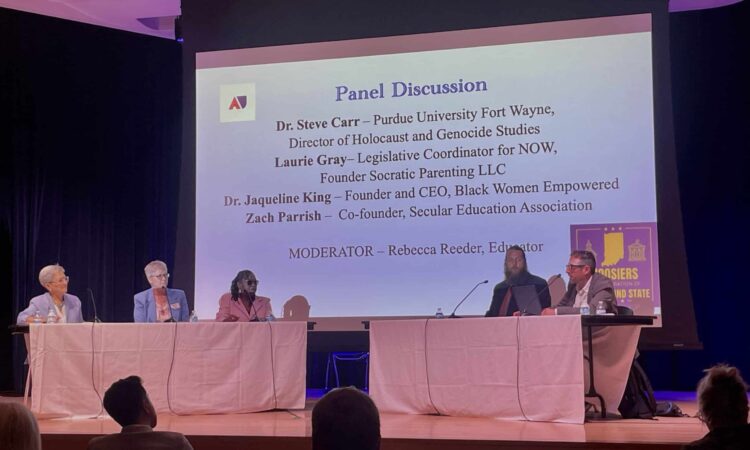
Parrish spoke about a bill passed by Indiana lawmakers in May that allows public school students to leave school for up to 120 minutes a week for religious instruction. Much of this instruction is now being done by an organization called LifeWise Academy, which takes children out of public schools during school hours to undergo Christian education. On their website they say they serve over 150 school districts nationwide, and in a promotional video they decry that the Bible, “the most transformative book in all of human history,” is banned from public schools. The same video declares that “the Bible as the key resource in every child’s education is indispensable.”
“It is so well-funded and organized,” Parrish said, “It’s a plug and play model that is franchised and designed to be that way, so that anybody can come into schools [and implement their curriculum].”
Parrish said that LifeWise has been instrumental in passing legislation requiring schools to offer Release Time Religious Instruction in Indiana, Ohio, Oklahoma, Texas, Iowa and Montana, and that they are continuing to lobby across the country.
“What we see is they are incentivizing them by giving them ice cream parties to recruit their friends,” Parrish said. “They’re sending golden invitations with their students to try and get the other kids to come with them, they’re making this so much fun — and what kid doesn’t want to leave school? They’re turning this into a mini field trip for a [class] period.”
Parrish described how his daughter, who opted out of the program, was ostracized for not participating in LifeWise.
“She was shoved into a study hall in the gymnasium in second grade to read by herself while all the other kids are going off campus to have ice cream and pizza parties and play games.”
“[Christian Nationalists] are attacking public schools,” Parrish said, “and that is by design.”
After the panel concluded, the music team from the Unitarian Universalist Congregation of Fort Wayne performed “Change on the Rise” by Avi Kaplan.
Fort Wayne native Marialyn, who preferred not to give her last name, almost didn’t attend the event on Saturday, but said that she was so glad she did.
“They had great speakers, lots of really great information, and lots of great ideas,” she said, echoing a sentiment heard in the hallways and stairwells after the event.
Greta Lapp Klassen is a freelance journalist based in Goshen, Indiana. More of her work can be found in Sojourners Magazine.
The Indiana Citizen is a nonpartisan, nonprofit platform dedicated to increasing the number of informed and engaged Hoosier citizens. We are operated by the Indiana Citizen Education Foundation, Inc., a 501(c)(3) public charity. For questions about the story, contact Marilyn Odendahl at marilyn.odendahl@indianacitizen.org.